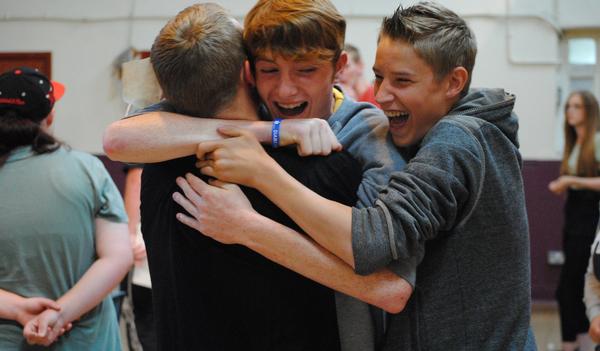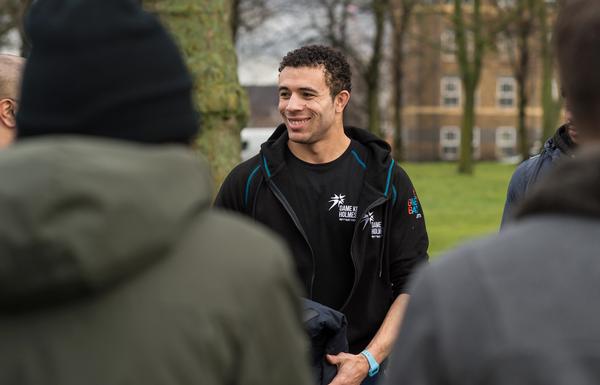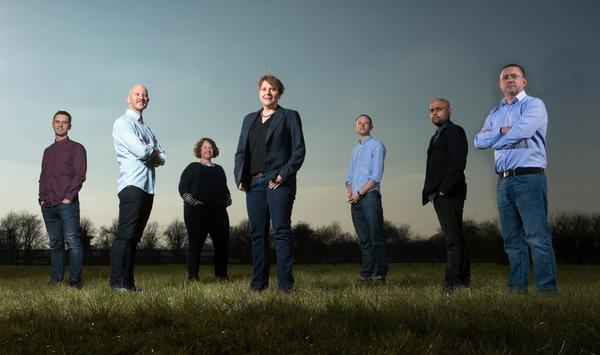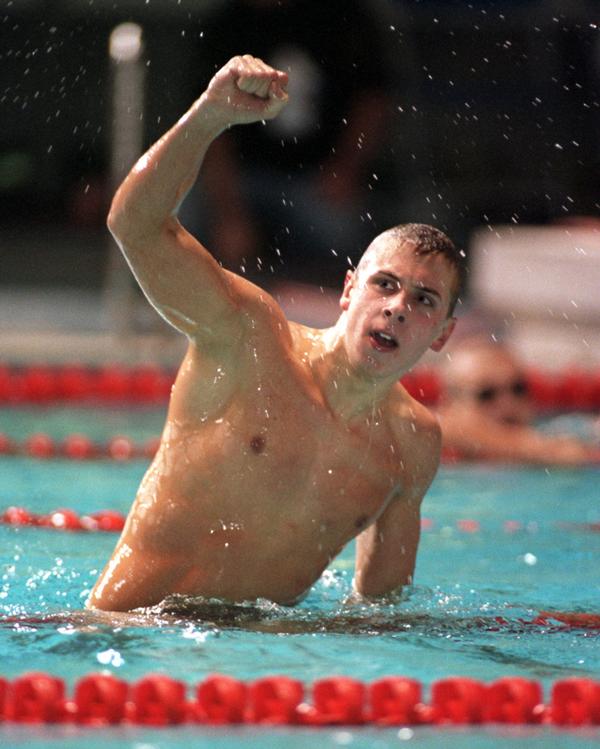|
Leisure Management - Dame Kelly Holmes Trust

Top Team

|
|
| Dame Kelly Holmes Trust
|
Tom Walker, Leisure Media
|
|
|
|
Launched by the double Olympic champion, Dame Kelly Holmes Trust uses the skills and attitudes of world class athletes to transform the lives of young disadvantaged people. Currently operating in across 39 locations across the UK, it is the only charity that offers a pathway to athletes from all team GB sports when they’re post-retirement and tackles issues around youth unemployment. Founded in 2008, it has impacted the lives of more than 300,000 young people. As part of a new strategy, published last year, it announced it will expand its reach to 104 locations. Sports Management spoke to the senior management team.
|
|
 |

Dame Kelly Holmes
Chair/president
Dame Kelly Holmes Trust
 |
|
What motivated you to launch the trust?
World class sports people have such amazing attitudes, which can make a significant difference to the lives of others, but too many of these athletes find themselves lost after having the structured world of training and competition removed when they are injured or when they retire.
That’s why I created the Trust; to close that gap. Eight years in, we have more than 200 athletes a year utilising their skills and giving back to society via our programmes, helping thousands of young people to change their attitude towards life. I got lucky early in my life and was set on the right path, but sadly not everyone has that chance. That’s where we can make a difference.
What are your future plans for the trust?
What we’ve achieved is just the beginning. It’s my dream that our work continues to grow and that we help even more young people to go on and in turn, to inspire positive change in others.
I’m as committed as ever and look forward to pushing ourselves even further over the next four years to reach more young people and athletes than ever before across every area of the UK.
As a charity, we’ve been on a journey a lot like the athletes and young people we support.
We’ve grown, but our mission and values remain firmly the same. I am proud to say that in partnership we’re doing something unique to help society and ensure the groups we work can live positive lives.
How big a role do your local partners play in the work you do?
It is because of our partners and supporters that we’ve been able to reach over 300,000 young people and hundreds of athletes and why they are a fundamental part of the wider Trust family.
I certainly wouldn’t have won my two gold medals without the amazing team behind me and this is still the case now with my charity.
“I’m proud to say we’re doing something unique to help society and improve lives”
| |


|

The trust has helped more than 300,000 young people in the UK |
|
|
 |

Emma Atkins
CEO
Dame Kelly Holmes Trust
 |
|
Career journey
I started as a sports development officer (SDO) in a local authority in Leicestershire – I was the authority’s first SDO so they didn’t really know what to do with me – so shoved me into the planning department!
After leaving Leicester I went to become regional manager at the National Coaching Foundation – now called Sports Coach UK. I worked my way through the ranks over 10 years there. The highlight was leading a national programme with DCMS to put coach development officers into every county in England. It was while at Sports Coach UK, in 2008, that I got a call from a “head hunter”, found myself speaking to Kelly Holmes and joined the trust as sport director. I’ve been here since we launched and became CEO last year.
The launch of the trust was somewhat interesting?
The day we launched, in 2008, was the day the banks crashed – quite literally. At the time our offices were hosted by a large financial company in the middle of the City of London and as we were setting up, people around us were clearing their desks and going home with their belongings in boxes.
It had a massive impact on us too. We had a business plan where corporate giving played a major part, so it became unbelievably tough to start up and keep things moving forward. Kelly was so passionate about it, however, that she put her own funding in to begin with. We weathered the storm and here we are – still going strong.
What does the trust do?
Kelly had the vision that no fellow athlete should feel lost when they reached the end of their career and she didn’t want athletes to be wasted to society. She wanted to combine that with helping young people facing disadvantage – another area she has personal experience of.
We began building systems around the athletes to improve their welfare and wellbeing, with the aim of eventually enabling them to give back to young people facing disadvantage.
How the cycle works is that we start with the athletes. We have athletes come (or be referred) to us, we then assess them – as they could be at a point where they have no money or a place to live. We then help them realise they’ve got all these amazing attitudes which helped them in sport and that can work for them in life.
When they’re ready and have gone through our rigorous assessments, we deploy them to work in our young people programmes, so they can unlock these attitudes in them. As a result our athletes become amazing vehicles for change in others.
We’ve been working really closely with UK Sport and since 2008 we’ve helped more than 400 athletes through our system. We currently have about 250 athletes receiving support through their transition and training. Around half of those are deployed in projects at the moment.
Why do you think you are so successful in what you do?
Our research shows the athletes who work with young people find it easier to adapt to their new life.
When we launched, I interviewed a lot of athletes who’d come to the end of their active career. Pretty much all said they felt as if they’d had all their friends taken away from them – their coaches, physios, trainers. Therefore, everything we structure around the athletes is done using a sense of community.
“Kelly had this vision that no athlete should feel lost when they finished their career“
| |


|

Working with young people makes it easier for athletes to adapt to their new lives after competitive sport |
|
|
 |

Ned Brown
Head of policy and impact
Dame Kelly Holmes Trust
 |
|
Describe your role
The main focus of my work is around research – and I also evaluate the effectiveness of our programmes. This means providing people with the information they need to design and deliver a programme and then make sure we’re measuring the projects. That way we can tell whether a programme is working or not.
How are programmes developed?
We start with a learning framework – a structure with which that programme will be delivered – and a set of outcomes we want to achieve. Our athletes then work with local partners to turn those into a detailed plan.
In other words, we have the intellectual property of the programme, the outcomes, the framework and structure. We then simply give it to athletes and local partners to develop at local level. That way we can guarantee that they are tailored for the exact needs of the young people they are working with, wherever they are.
What’s the best thing that’s happened so far in your work at the Trust?
A stand out individual moment was in Leeds at a “Go” event – which marks the end of the intensive part of our Get on Track projects. A number of young people stood up and talked about the journeys they’d been on and how their athlete mentor was influencing their lives.
It was an exceptional moment. I remember getting on the train back to London that night and not really reading or doing any work – I just stared out the window and reflected on the power that our athletes have in helping young people to be the best they can. To be able to witness that happening, is a real privilege.
“What’s important to us in our partnerships is that there’s a common understanding of values”
| |


|

The senior management team will be kept busy by plans to expand operations from 39 to 104 locations across the UK |
|
|
 |

Adam Whitehead
Head of athlete programmes
Dame Kelly Holmes Trust
 |
|
Could you describe your career journey
I was an international swimmer for 10 years, which allowed me to train full time and compete in major championships. My career highlights were becoming European and Commonwealth champion.
After retiring at 26, the trust retrained me to become a mentor and start supporting young people on our programmes – I joined in 2012.
What does your role involve?
I lead on everything to do with athletes. This includes athlete transition support, training and development as well as writing new programmes.
What are the main challenges you face with working with athletes?
Each athlete is different, but there are some common themes. Often athletes feel lost and struggle with a lack of identity post retirement. Often their sport has led them to become almost institutionalised and created a very narrow identity.
Sometimes this results in mental health issues, but also a new search for fulfilment. That’s why working on our programmes really benefits the athlete, as they feel they’re contributing to society.
How do you identify the athletes to take on?
We work with organisations like UK Sport, the British Olympic Association and the English Institute of Sport to ensure athletes know about us.
“Post retirement, athletes often feel lost and struggle with a lack of identity”
| |


|

Adam Whiteheadis a former European and Commonwealth champion |
|
|
 |

Ben Hilton
Head of young people programmes
Dame Kelly Holmes Trust
 |
|
What does your role involve?
Making sure our young people’s programmes are working effectively and that the people on the programmes are seeing an impact on their lives.
I also need to make sure that our partners are delivering and working well with our athletes.
How do the programmes work?
Our flagship programme is Get on Track, a 14-month personal social development scheme delivered with our partners to recruit young disadvantaged people. The programme starts with “On Your Marks”, three days of quick, high intensity, personal social development. It uses lots of physical activity to support those young people to form a team.
At the end of the three days there’s a big challenge where the youngsters have to, as a team, plan and achieve a challenge we set them. The success rate for that challenge is around 40 per cent – so the most important learning isn’t instant success, but the process of reflection.
The second stage of the programme is called Get Set, during which the young people deliver a community-based social action project. They decide on the issue they want to tackle – such as providing disability sport sessions. The team then finds a venue and we help them organise it.
After they’ve delivered the project, we connect them with employers and take them to meet businesses, where they can – often for the very first time – talk to employees about how they got their job and what their career paths were.
Get on Track takes eight weeks to complete and after that we set them on their way to achieve. For the next 12 months we keep in touch and support them in their progress.
“Lots of the young people we work with face multiple barriers to achieving”
|
|
 |

Kamal Chadha
Head of finance
Dame Kelly Holmes Trust
 |
|
What does your role involve?
I manage the finance department, so I do all the reviewing when it comes to our delivery partners, to make sure we’re spending the money appropriately. I also do the management accounting, budgeting and forecasting as well as payroll and VAT returns.
How important is having water-tight finances in the current climate
I think it’s crucial. Personally, I’ve always questioned spending money excessively – especially when there is public money involved. Charity money should be spent on the issue the charity is trying to improve.
Does Dame Kelly ever get involved in finances?
She has her head very much screwed on and will grill you in the board meetings about everything we do. She questions everything and is very focused – she reads every report to the minutest detail, so she’s a great president/chair to have.
I met her on my second day in the job and from the very first conversation it was obvious just how passionate she was about the trust.
Around 75 per cent of our revenues go back into the programmes – a high return. We certainly don’t have any marble floors and we don’t send our senior management team on expensive away days – our senior staff meetings are held in a function room above the pub across the road.
“75 per cent of our revenue goes back into the programmes – which is more than most”
|
|
 |

Tracey Carter
Head of fundraising
Dame Kelly Holmes Trust
 |
|
Where does your funding come from?
As well as public funding from Sport England, the key income sources are trusts, foundations, companies and individuals.
We’ve got a really good range of partnerships with companies and trusts. For a charity our size, it’s important to maintain a really diverse spread of income sources. We don’t want to be too dependent on funding from a single source because that’s how you manage risks. Securing a charity’s fundraising is all about managing the risk.
What does having Dame Kelly’s name attached to the charity mean?
It can have a huge effect – we had a lifeline appeal on BBC One last year and a lady who’d seen it called us directly. She had been blown away by what we do as it reflected her personal experiences.
As a young person she had turned her life around thanks to having a person in their life who provided her with a positive influence – similar to what we do with our athletes.
She’s in her late 70s and has now made a legacy to us in her will – simply because the way she connected with us and the way we help young people.
We’re very proud of our brand and when it comes to funding, we like to work with partners on a brand level – in sponsorship for example. We’re always looking to work with brands where we can add value and vice versa.
“Managing a charity’s fundraising is all about managing the risks”
| |


|

The interaction between young people and athletes is beneficial for both |
|
|
 |
| Originally published in Sports Management 04 Apr 2016 issue 117
|
|
 |
|